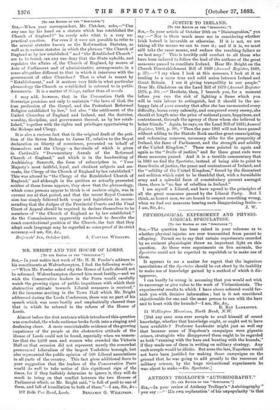(TO THE EDITOR OF THE " SPECTATOR:1
Sin,—When your correspondent, Mr. Fletcher, asks,—" Can any one lay his hand on a statute which has established the Church of England ?" he surely asks what is a very un- practical question. For even if it were not possible to refer to the several statutes known as the Reformation Statutes, as well as to various statutes in which the phrases "the Church of England as by law established" and "the Established Church" are to be found, can any one deny that the State upholds, and regulates the affairs of, the Church of England, by means of Acts of Parliament and of administrative arrangements, in a sense altogether different to that in which it interferes with the government of other Churches ? That is what is meant by "Establishment," and it matters very little in what particular phraseology the Church so established is referred to in public documents. It is a matter of things, rather than of words.
I may add, however, tha.t in the Coronation Oath the Sovereign promises not only to maintain "the laws of God, the true profession of the Gospel, and the Protestant Reformed Religion established by law," but also "the settlement of the United Churches of England and Ireland, and the doctrine, worship, discipline, and government thereof, as by law estab- lished," together with the rights and privileges appertaining to the Bishops and Clergy.
It is also a curious fact that in the original draft of the peti- tion of the Seven Bishops to James II., relative to the Royal declaration on liberty of conscience, presented on behalf of themselves and the Clergy—a fac.simile of which is given in Cardwell's "Documentary Annals of the Reformed Church of England," and which is in the handwriting of Archbishop Sancroft, the form of subscription is, "Your Majesty's most faithful, loyal, and obedient subjects and ser- vants, the Clergy of the Church of England by law established." This was altered to "the Clergy of the Established Church of England," and although in the petition as actually presented neither of these forms appears, they show that the phraseology, which some persons appear to think is of modern origin, was in current use at that period, and that the recent Royal Commis- sion has simply followed both wage and legislation in recom- mending that the Judges of the Provincial Courts and the Final Court of Appeal should be required to declare themselves to be members of "the Church of England as by law established." As the Commissioners apparently undertook to describe the exact constitutional position of the Church, the fact that they adopt such language may be regarded as some proof of its strict accuracy.—I am, Sir, &c.,


































 Previous page
Previous page